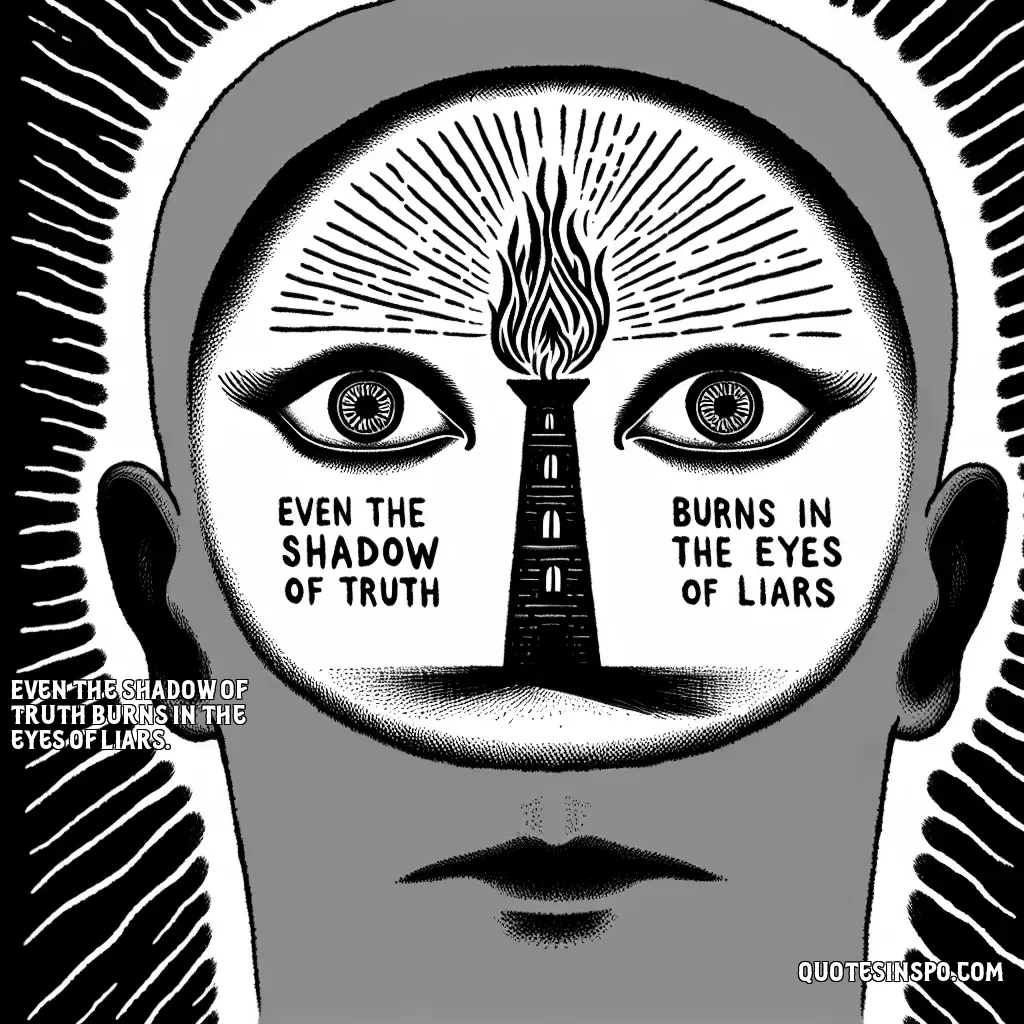
Even the shadow of truth burns in the eyes of liars.
The quote "Even the shadow of truth burns in the eyes of liars" suggests that liars are disrupted by truth, even at its faintest suggestion. When people resort to deceit, they construct a reality that aligns with their falsehoods. The "shadow of truth" implies a subtle, indirect indication of truth. Even this shadow is uncomfortable for liars, highlighting their inherent discomfort with authenticity. Liars rely on deception to maintain a facade, but truth, even in minimalistic form, challenges the legitimacy of their constructed narratives. This truth provokes a sense of unease or fear, symbolized by 'burning in the eyes,' as it threatens to unravel the false reality they have built. Even a mere hint of truth can expose their vulnerabilities and disrupt their web of lies. The metaphor of 'burning in the eyes' also suggests that liars cannot face truth comfortably. Eyes are often considered windows to the soul, so if truth burns in their eyes, it indicates an inward, deep discomfort. This makes the confrontation with truth not only external but also a personal, psychological struggle. In essence, the quote emphasizes the power of truth to disrupt falsehoods and the natural conflict between reality and deception. It serves as a reminder that truth is potent, and those who engage in lies live with the constant fear of exposure. Hence, the shadow of truth not only challenges and discomforts liars but also stands as a testament to the inevitable tension between honesty and deceit.
Quote By: Aleksandr Solzhenitsyn
**Biography of Aleksandr Solzhenitsyn**
Aleksandr Solzhenitsyn, born on December 11, 1918, in Kislovodsk, Russia, was a prominent Russian novelist, historian, and dissident known for his critical views on the Soviet regime. Growing up in a world overshadowed by the aftermath of the Russian Revolution, Solzhenitsyn developed a profound sense of social justice and a deep understanding of human suffering. This fascination with the human condition and moral dilemmas later became central themes in his literary works.
Solzhenitsyn's academic journey began at the Rostov State University, where he studied mathematics and physics, but his life took a dramatic turn when he was drafted into the Red Army during World War II. He was later arrested for criticizing Joseph Stalin in letters to a friend and was sentenced to eight years in a labor camp, a harrowing experience that would serve as the foundation for many of his writings. After his release in 1953, Solzhenitsyn continued to expose the realities of life under Soviet rule, particularly the brutalities of the Gulag system, which he vividly depicted in his groundbreaking book, *One Day in the Life of Ivan Denisovich* (1962). This work not only earned him international acclaim but also marked a significant moment in Soviet literature by shedding light on the oppressive mechanisms of the state.
Throughout his career, Solzhenitsyn produced a significant body of work that included novels, essays, and historical narratives, most notably *The Gulag Archipelago*, published in three volumes between 1973 and 1975. In this monumental work, Solzhenitsyn documented the systemic abuses of the Soviet prison camps, ultimately leading to increased awareness and condemnation of the regime worldwide. His courage and unwavering commitment to truth earned him the Nobel Prize in Literature in 1970, although he was unable to accept it in person, as he was living in exile.
After years of living abroad, Solzhenitsyn returned to Russia in 1994 following the collapse of the Soviet Union, where he continued to write and engage in public discourse. Aleksandr Solzhenitsyn's legacy remains profound; he is celebrated as one of the 20th century's most significant literary figures, whose works continue to challenge readers to reflect on the moral complexities of freedom, truth, and the human spirit. He passed away on August 3, 2008, leaving behind a vital literary legacy that continues to inspire and educate.